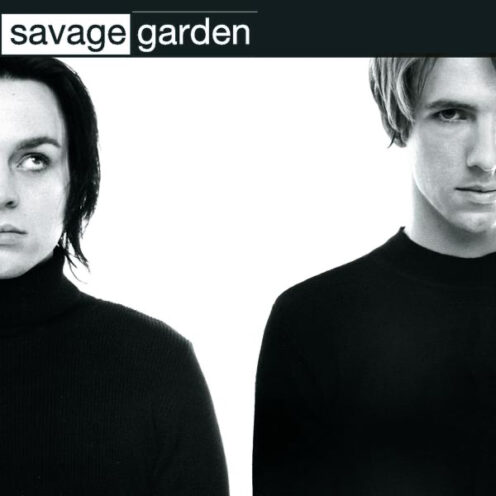
A lot has changed since Savage Garden released their eponymous debut album in 1997. Not that it’s surprising — everything from technology to politics has rapidly transformed in just 25 years, so why shouldn’t music also follow that trend? Pop music today is closer to Savage Garden than pop music of ten years ago, strangely enough. I love seeing The Weeknd, Paramore, and Dua Lipa inspired by the glitz of 80s synth-pop and improving on pop-punk with empowerment and new stories. In a way, I suppose the music that multi-instrumentalist Daniel Jones and vocalist Darren Hayes have released, both from their time as a duo and Hayes’ solo career, hasn’t truly left us.
As a kid growing up in Australia in the late 90s and early 2000s, Savage Garden were inescapable. They were making music when there was more funding for showcasing Australian music. You’d hear “Truly Madly Deeply” on the radio (which I heard on the radio days ago, coincidentally, so that you know how omnipresent the singles are in this country). They performed on weekend television, we played their albums in my house, people still argue about misheard lyrics to “I Want You,” and they sold a shit ton of records. They performed at the 2000 Sydney Olympic Games Closing Ceremony. Delta Goodrem reworked her classic “Lost Without You” with Hayes. They played to huge audiences in their home city of Brisbane, Australia, a rousing response, to be sure, following mammoth tours around the country. Hell, Hayes even sang by Luciano Pavarotti’s side in a 2000 concert for Cambodia and Tibet. Savage Garden were massive, and rightfully so.
I have loved Savage Garden for my entire life. As a child, I couldn’t articulate why they resonated with me. Hayes and Jones look like cool adventurers in the “To the Moon and Back” music video (video three, the most played of the three versions released), galavanting around New York on a subway and rescuing a young woman from her dreary life. “To the Moon and “Back” is all bombast. Jones plays a ringing guitar riff, backed by a commanding bassline and drums that go hard. The song’s lyrical content proves that Hayes is a virtuoso songwriter. While “I would fly you to the moon and back/if you’ll be, if you’ll be my baby” reads like a million lines you’ve heard before, the stanzas that precede and come after are the actual bones of the story. Identifying with the mother who didn’t love their child that much or the father that never kept in touch, what does a neglected childhood lead to in adulthood?
While Savage Garden were larger than life, they never forgot to touch down to earth again. That’s why “Break Me Shake Me” rules so much. Pulling from Hayes’ Michael Jackson and Madonna influence, the track’s bass guitar, finger clicks, and smooth vocals are dominant. How can you not dance along? Speaking of dancing, the crucial but overlooked “Carry on Dancing” is a self-proclaimed soundtrack to a vampire’s ball. I mean, at this point, could Savage Garden cater any more to teenage Mary’s interests? Vampires, enthralling melodies, and a gothic string section? You could tell me that “Carry on Dancing” was manufactured in a laboratory specifically for me, and I might believe you.
Of course, there are glaring products of their time scattered on Savage Garden, too, like the very cheesy 90s keyboard on “Universe,” a song about second-guessing yourself; “A Thousand Words” recalls Kim Wilde’s 1986 hit, “You Keep Me Hangin’ On”. Meanwhile, “Promises” replaced “Mine” on the second track listing as the duo’s US label was concerned about “Mine” making a mention of crucifixes. “Promises” and the controversy around “Mine” feel exceedingly dated. However, the haircuts during this era are the most obsolete of all.
A charmingly sad thing about looking back on Savage Garden is that we have moved so far forward; today’s stars and up-and-comers — Lil Nas X, Rina Sawayama, Janelle Monae — are out and proud. Hayes pondered with Billboard upon the 20th anniversary of Savage Garden in 2017 whether or not his solo music would have received more airplay if he hadn’t publicly come out as gay or if he released the music today. While Hayes was never explicitly blacklisted from the music industry, Columbia Records banned Hayes from making live television performances during the promotion of his first solo record, Spin, and made him look “less gay” for the “Insatiable” music video shoot in 2002; whatever that means. In that respect, we’ve come a very long way in 25 years when Orville Peck is campy and writes queer songs to great success. Savage Garden paved the way for homegrown talents Troye Sivan and Cub Sport. With Hayes’ dreams about kissing boys (“I Want You”) and “Affirmation,” among others, he inspires us all to express our dreams and desires freely, just like Pet Shop Boys and Bronski Beat did for British LGBTQIA+ artists in the 1980s.
When I listened to Savage Garden as a child and listen to them now, the feelings are the same. They mirror what my friend Rowan recently wrote about the new Gang of Youths album, angel in realtime. As he said about Australia’s best current band, Savage Garden fills me with pride that we somehow produced a band this good, so pure in their honesty and musical influences. I looked at Darren and Daniel and saw what was possible for me: I could live a life in music, and I wouldn’t let anybody stop me. I didn’t look at them and grieve for what could have been; I didn’t have to wish that they were born overseas to be successful because they made it. They also called it quits when it was time, no matter how badly we wanted a third album. Savage Garden proved to every Australian kid that they could do anything. Savage Garden remains an all-time classic for dreamers like me.
 To the Moon and Back
To the Moon and Back